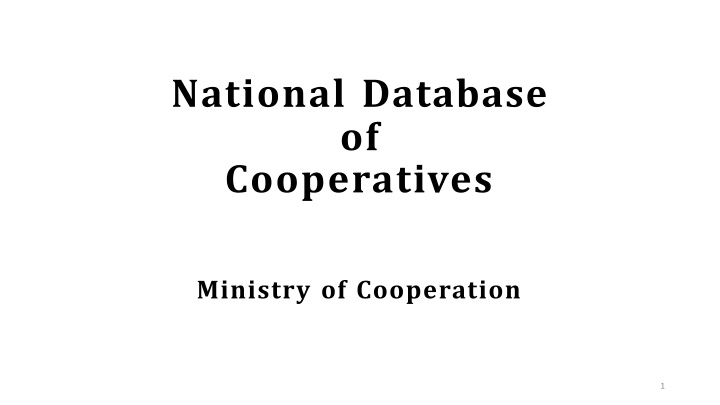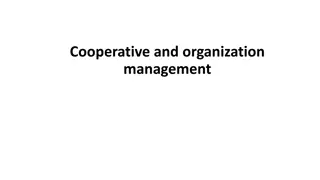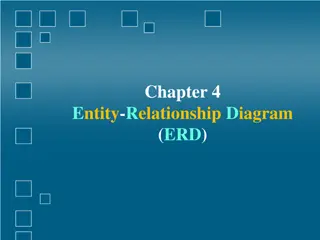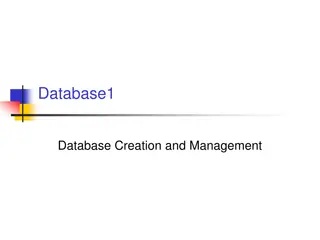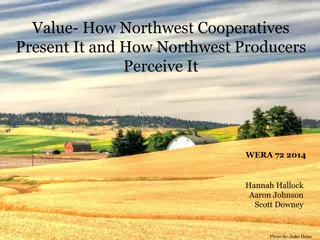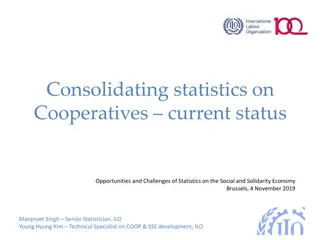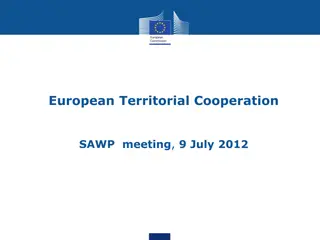National Database of Cooperatives: Ministry of Cooperation Initiatives
The Ministry of Cooperation is developing a National Database of Cooperatives to enhance transparency, governance, and policymaking in the cooperative sector. The database aims to provide comprehensive information on cooperatives across sectors, improve coordination among stakeholders, and facilitate better decision-making. Various initiatives like consultations, structuring data processes, and data dissemination strategies are underway to establish this central database. The system will offer a platform for cooperatives to voluntarily contribute data, with plans for both static and dynamic components. Additionally, efforts are being made to ensure easy access to information for various entities and to implement a dedicated help desk for assistance.
Download Presentation

Please find below an Image/Link to download the presentation.
The content on the website is provided AS IS for your information and personal use only. It may not be sold, licensed, or shared on other websites without obtaining consent from the author.If you encounter any issues during the download, it is possible that the publisher has removed the file from their server.
You are allowed to download the files provided on this website for personal or commercial use, subject to the condition that they are used lawfully. All files are the property of their respective owners.
The content on the website is provided AS IS for your information and personal use only. It may not be sold, licensed, or shared on other websites without obtaining consent from the author.
E N D
Presentation Transcript
National Database of Cooperatives Ministry of Cooperation 1
Current Scenario At present, there cooperatives is no comprehensive available with the Ministry of and authentic database on Cooperation. The creating a National Database on Cooperatives. Ministry has already started consultations with stakeholders on finalization and inclusion procedures and processes for the database; 23rdDecember, 2021 5thJanuary, 2022 7thFebruary, 2022 Ministry of Cooperation has initiated process for of various parameters, 2
Introduction and Objectives of the Database The objective of developing National Database on Cooperatives is to provide a single point access to information on cooperatives of different sectors and develop a process for better understanding of cooperatives. The proposed database may function as the main planning tool for Central Ministries, State Governments, Cooperators and Sectoral Institutions cooperative sector. Cooperative like NABARD, Federations, etc. for It is envisaged to facilitate in policy making, improve governance and improve transparency. It may also help the cooperative sector for its better positioning in the business environment. The proposed database intends to bring synergy among line ministries and state governments. 3
Functioning and Workflow of the Database The system would be made available as a platform and can easily be adopted for various activities over a period of time. The filing of data may be kept voluntary for the cooperatives. The platform of database would be available on 24*7 bases using internet in a faster and secure environment adopting standard open technologies. There are two components of the database: static and dynamic. The dynamic database components (financial details) need to be updated on annual basis as on the closure of financial year. In order to populate the data and understand the ground realities, it is proposed that we may request the cooperatives to fill up the additional data for previous two years (2019-20 and 2020-21). 4
Data Dissemination and Report Generation Central Federations and other stakeholders may be provided access to data as per the Open Data Policy of Government of India. Ministries, NABARD, State Authorities, National Quarterly bulletin may be issued giving significant insight to the data. A dash board/ analytics of information would be made available to public. There shall be a dedicated help desk and toll free number to assist Cooperatives/Federations. 5
Work Done by the Ministry At present Data Analytics Division, M/o Cooperation is working on the prototype of the National Cooperative Database in the MS Access database. The Division has already finalized various parameters or fields to be incorporated in the proposed database. The structure and design of the data collection template of proposed database is in the finalization stage. Different tables/blocks/forms/reports of the database has been created in MS Access for demonstration purpose and may be communicated to the software developer. 6
Static Blocks of the Database The proposed database has been divided in the static and dynamic blocks. The static blocks will contain the fields which remain unchanged for a comparatively longer period of time. The outline of the Static block is listed detailed fields will be shown in further slides. A. Identification Block B. Particular Block C. Operative Detail Block D. Details of Board of Director Block E. Use of ICT Block below and 7
Dynamic Blocks of the Database The dynamic updated annually after the closure of the financial year. blocks may have fields that may be The outline of the Dynamic blocks is listed below and the detailed fields will be shown in further slides. F. Employment and Labour Cost Block G. Income and Expenditure Block H. Asset and Liability Block I. Products, Services and Schemes Block J. Verification and Submission Block 8
Proposals of Ministry The Ministry is planning to held a Workshop with State Registrar of Cooperative Societies (RCS), Cooperative Federations, NCCT, Training Institutes, NABARD for finalisation of Sector-Specific Fields of the proposed Database. The Federations to organise awareness campaign about the importance of proposed National Database for policy making at grass root level and encouraged them to enter requisite data at Cooperative level itself. Ministry may facilitate State Governments, Cooperative Keeping in view of workload involved and practices followed for data collection in similar Census/Surveys, like Economic Census, NSS Surveys, the Ministry may keep Budgetary provisions of honorarium to meet data entry related expenditure. 20
Way Forward The database may be prepared in such a way that it may help the State Governments for registration of the new cooperatives. The portal may turn into a national portal of registration of cooperatives. However, it would depend on further customisation as per the needs of the registering Government and on boarding of State Governments. authorities in State The portal may be linked to GEM (Government E platform so that cooperatives can sell their products and services at that platform. Market) 21
Thank You 22
